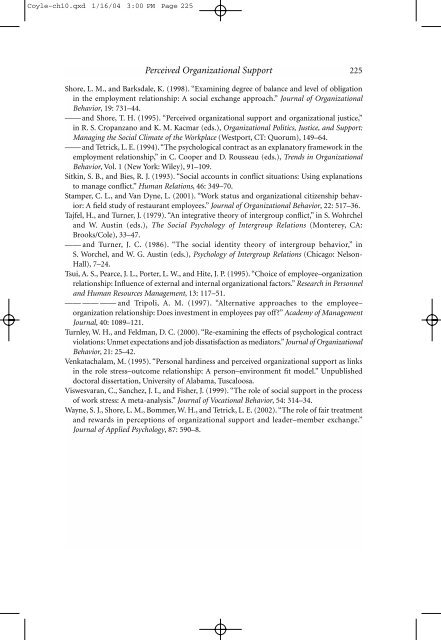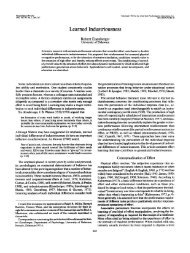Perceived Organizational Support
Perceived Organizational Support
Perceived Organizational Support
Create successful ePaper yourself
Turn your PDF publications into a flip-book with our unique Google optimized e-Paper software.
Coyle-ch10.qxd 1/16/04 3:00 PM Page 225<br />
<strong>Perceived</strong> <strong>Organizational</strong> <strong>Support</strong> 225<br />
Shore, L. M., and Barksdale, K. (1998). “Examining degree of balance and level of obligation<br />
in the employment relationship: A social exchange approach.” Journal of <strong>Organizational</strong><br />
Behavior, 19: 731–44.<br />
—— and Shore, T. H. (1995). “<strong>Perceived</strong> organizational support and organizational justice,”<br />
in R. S. Cropanzano and K. M. Kacmar (eds.), <strong>Organizational</strong> Politics, Justice, and <strong>Support</strong>:<br />
Managing the Social Climate of the Workplace (Westport, CT: Quorum), 149–64.<br />
—— and Tetrick, L. E. (1994). “The psychological contract as an explanatory framework in the<br />
employment relationship,” in C. Cooper and D. Rousseau (eds.), Trends in <strong>Organizational</strong><br />
Behavior, Vol. 1 (New York: Wiley), 91–109.<br />
Sitkin, S. B., and Bies, R. J. (1993). “Social accounts in conflict situations: Using explanations<br />
to manage conflict.” Human Relations, 46: 349–70.<br />
Stamper, C. L., and Van Dyne, L. (2001). “Work status and organizational citizenship behavior:<br />
A field study of restaurant employees.” Journal of <strong>Organizational</strong> Behavior, 22: 517–36.<br />
Tajfel, H., and Turner, J. (1979). “An integrative theory of intergroup conflict,” in S. Wohrchel<br />
and W. Austin (eds.), The Social Psychology of Intergroup Relations (Monterey, CA:<br />
Brooks/Cole), 33–47.<br />
—— and Turner, J. C. (1986). “The social identity theory of intergroup behavior,” in<br />
S. Worchel, and W. G. Austin (eds.), Psychology of Intergroup Relations (Chicago: Nelson-<br />
Hall), 7–24.<br />
Tsui, A. S., Pearce, J. L., Porter, L. W., and Hite, J. P. (1995). “Choice of employee–organization<br />
relationship: Influence of external and internal organizational factors.” Research in Personnel<br />
and Human Resources Management, 13: 117–51.<br />
—— —— —— and Tripoli, A. M. (1997). “Alternative approaches to the employee–<br />
organization relationship: Does investment in employees pay off?” Academy of Management<br />
Journal, 40: 1089–121.<br />
Turnley, W. H., and Feldman, D. C. (2000). “Re-examining the effects of psychological contract<br />
violations: Unmet expectations and job dissatisfaction as mediators.” Journal of <strong>Organizational</strong><br />
Behavior, 21: 25–42.<br />
Venkatachalam, M. (1995). “Personal hardiness and perceived organizational support as links<br />
in the role stress–outcome relationship: A person–environment fit model.” Unpublished<br />
doctoral dissertation, University of Alabama, Tuscaloosa.<br />
Viswesvaran, C., Sanchez, J. I., and Fisher, J. (1999). “The role of social support in the process<br />
of work stress: A meta-analysis.” Journal of Vocational Behavior, 54: 314–34.<br />
Wayne, S. J., Shore, L. M., Bommer, W. H., and Tetrick, L. E. (2002). “The role of fair treatment<br />
and rewards in perceptions of organizational support and leader–member exchange.”<br />
Journal of Applied Psychology, 87: 590–8.



